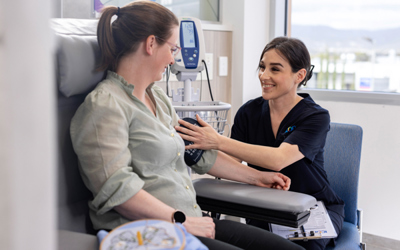Quick facts about testicular cancer
Each year in the UK, around 2,300 men are diagnosed with testicular cancer.
Testicular cancer is usually curable
Testicular cancer typically forms in germ cells, which are cells that produce sperm. Germ cell tumours make up 95% of testicular cancers.
Types of testicular cancer
There are two main types of testicular cancer:
-
Seminoma testicular cancer
This type of testicular cancer forms in germ cells and typically grows more slowly compared to non-seminoma testicular cancer. It is more likely to develop in men in their 40s.
-
Non-seminoma testicular cancer
In non-seminoma testicular cancer, the tumour contains at least one of the following subtypes: teratoma, choriocarcinoma, yolk sac tumour or embryonal carcinoma, or a mix of different cells. It develops more quickly than seminoma cancers. Non-seminoma testicular cancer is more common in men in their late teens and up to age 35.
Signs and symptoms of testicular cancer
As signs and symptoms for testicular cancer can be similar to other common conditions, it’s important to see your GP or healthcare professional if you experience any of the symptoms below. Discussing anything concerning with your doctor as soon as possible can help give you peace of mind and offer the best chance of successful treatment if you receive a testicular cancer diagnosis.
Symptoms may include:

A painless swelling or lump in testicle

Changes to the size or shape of a testicle

A feeling of heaviness in the scrotum

A dull ache, pain or discomfort in the lower abdomen, testicle or scrotum

Back pain

Breast growth or tenderness
Stages of testicular cancer
The TNM system is used to stage testicular cancer, and it helps doctors understand what your cancer looks like. The TNM stands for:
Tumour – The degree to which the tumour has affected other tissue
Node – Is a measure of whether lymph nodes have been affected
Metastasis – The degree to which the cancer has spread to other organs of the body, such as the lungs
The TNM information, along with other tests, helps determine the stage of your testicular cancer using the guidelines below:
-
Stage IA testicular cancer
The cancer is confined to the testicle and has not grown into the epididymis, hilar soft tissue, or lymphatic/blood vessels. The tumour may have grown into the inner membrane surrounding the testicle (tunica albuginea), but not the outer membrane (tunica vaginalis). If the tumour is seminoma cancer, it is smaller than 3 cm. Tumour markers are normal.
-
Stage IB testicular cancer
The cancer has grown into the epididymis, hilar soft tissue, outer membrane (tunica vaginalis), lymphatic/blood vessels, spermatic cord or scrotum. Tumour markers are normal.
-
Stage IS testicular cancer
The cancer is confined to the testicle. However, one (or more) tumour markers levels are elevated. This often means that the cancer cells may have spread outside the testicle but have not spread to lymph nodes or distant areas of the body (that could be detected on scans).
-
Stage IIA testicular cancer
The cancer has spread to no more than five nearby lymph nodes and none are larger than 2 cm. Tumour markers are normal or slightly elevated.
-
Stage IIB testicular cancer
The cancer has spread to nearby lymph nodes and is between 2 cm and 5 cm in size. Tumour markers are normal or slightly high.
-
Stage IIC testicular cancer
The cancer has spread to nearby lymph nodes and is larger than 5 cm. Tumour markers are normal or slightly high.
-
Stage IIIA testicular cancer
The cancer has spread to distant lymph nodes and/or the lungs. Tumour markers are normal or slightly high.
-
Stage IIIB testicular cancer
The cancer has spread to distant lymph nodes and/or the lungs but not to other organs. At least one tumour marker is substantially higher than normal.
-
Stage IIIC testicular cancer
The cancer has spread to distant lymph nodes and/or the lungs and at least one tumour marker is very high. Alternatively, the cancer has spread to distant areas of the body other than the lymph nodes or lungs.
Treatment for testicular cancer
There are many different types of treatment for testicular cancer. Your treatment will depend on you and your cancer.




